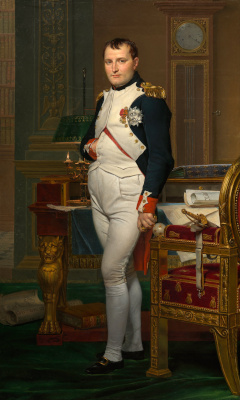Napoleon Bonaparte: Emporer of France
Napoleon Bonaparte was a famous leader who lived a long time ago in France. He was born in 1769 on the island of Corsica. Napoleon became a military general and later became the Emperor of France. He was really good at leading armies and won many battles. Napoleon was a short man, but he was very smart and ambitious. He wanted to make France powerful and successful. He made many changes in France, like creating new laws and improving the government. Some people really liked him because he brought stability to France, but others didn't because he fought in wars and wanted a lot of power. In the end, Napoleon faced some challenges and was defeated at the Battle of Waterloo in 1815. He was then sent to a faraway island called Saint Helena, where he lived until he passed away. Even though he faced ups and downs, Napoleon Bonaparte is remembered as a great military leader and an important figure in history.

Fun Facts
Napoleon Bonaparte was a fascinating historical figure known for his remarkable leadership and significant impact on history. Here are some fun facts about him:
Short Stature: Despite popular belief, Napoleon wasn't very short for his time. He stood around 5 feet 6 inches, which was average height during the late 18th century.
Love for Mathematics: Napoleon was a bright student who loved mathematics. He used his mathematical skills in military strategies and planning battles.
Emperor and Military Genius: He became Emperor of France at a young age and was an excellent military strategist. He won many battles and conquered large parts of Europe.
Napoleon's Hat: He often wore a distinctive hat called a "bicorne." Unlike the convention of the time, which was to wear bicornes pointing forward and back, Napoléon wore his sideways, ensuring that he was instantly identifiable by his lieutenants on the battlefield.
Timeline
1769 Napoleon was born on the island of Corsica.
1784 He entered the French military academy.
1799 Napoleon seized power in France through a coup d'état.
1804 He declared himself Emperor of the French.
1805 Napoleon won the famous Battle of Trafalgar against the British navy.
1812 He faced a major setback during his invasion of Russia, known as the disastrous Russian campaign.
1814 Napoleon was forced to abdicate and was exiled to the island of Elba.
1815 He famously escaped from Elba and returned to France for a brief period known as the Hundred Days.
1821 He died in exile on Saint Helena.
Napoleon's Impact on the World
Napoleon left a big mark on history. He made many changes to France's laws, creating a legal system called the Napoleonic Code that is still used in some countries today. He also spread some of the ideas of the French Revolution, like equality and individual rights, to other parts of Europe. Napoleon's conquests and actions helped shape the modern map of Europe and influenced how countries worked together.